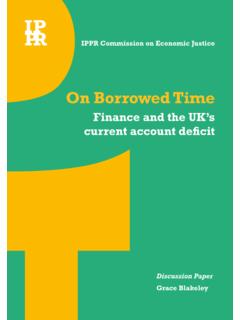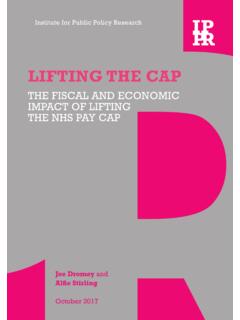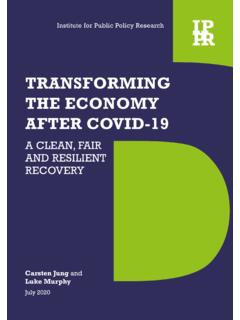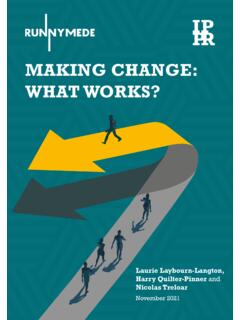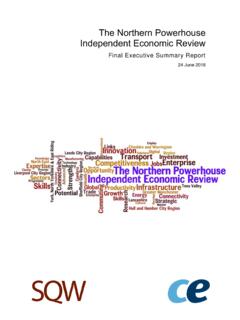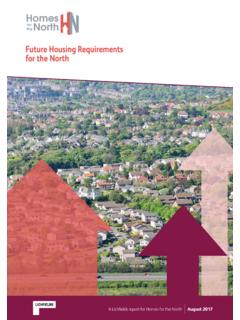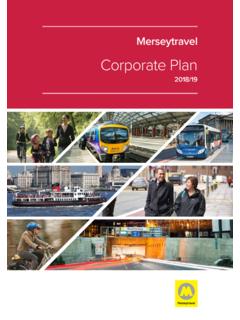Transcription of Quick wins for the North's transport network - ippr.org
1 Institute for Public Policy Research Quick WINS. FOR THE North's . transport network . Luke Raikes March 2019. ABOUT IPPR NORTH. IPPR North is the dedicated think tank for the north of England, with bases in Manchester and Newcastle. IPPR, the Institute for Public Policy Research, is the UK's leading progressive think tank. We are an independent charitable organisation with our main office in London. IPPR Scotland is based in Edinburgh. IPPR's purpose is to conduct and promote research into, and the education of the public in, the economic, social and political sciences, science and technology, the voluntary sector and social enterprise, public services, and industry and commerce.
2 20th Floor City Tower Piccadilly Plaza Manchester M1 4BT. T: +44 (0)161 694 9680. E: Registered charity no: 800065 (England and Wales), SC046557 (Scotland). This paper was first published in March 2019. IPPR 2019. The contents and opinions expressed in this paper are those of the authors only. The progressive policy think tank CONTENTS. 1. The 6. Northern transport : A brief 7. transport for the 9. 2. Quick wins: 3. Six Quick wins for the 1. Reopening of the Ashington Blyth and Tyne railway for passenger 14. 2. Leeds Bradford Airport Parkway rail 3. Supporting the development of hydrogen 19. 4. Tees Valley rail 22. 5. Integration of traffic management to improve air 26. 6. Tees 29.
3 4. Conclusions and IPPR NORTH | Quick wins for the North's transport network 1. ABOUT THE AUTHOR. Luke Raikes is a senior research fellow at IPPR North. ACKNOWLEDGEMENTS. The author would like to thank the many stakeholders that attended roundtables across the North and contributed to the longlisting and shortlisting process. He would also like to thank the staff of local authorities and combined authorities who contributed supplementary information to these case studies, and in particular transport for the North for engaging with this project throughout. He would also like to thank IPPR North colleagues: Leah Millward and Marcus Johns for the mapping, director Sarah Longlands for feedback on later drafts, and Ed Cox for chairing the roundtables and feeding in to early drafts of the report.
4 Supported by: Download This document is available to download as a free PDF and in other formats at: Citation If you are using this document in your own writing, our preferred citation is: Raikes L (2019) Quick wins for the North's transport network , IPPR North. Permission to share This document is published under a creative commons licence: Attribution-NonCommercial-NoDerivs UK. For commercial use, please contact 2 IPPR NORTH | Quick wins for the North's transport network SUMMARY. The North's transport network is currently in crisis, but there are major opportunities ahead. The chaos faced by passengers in the summer of 2018. revealed long-term structural weaknesses in the network , which have resulted from decades of central government underspending.
5 But in February 2019 a potential future was revealed as transport for the North (TfN) published their Strategic transport Plan, an outline business case for Northern Powerhouse Rail and their investment pipeline. This marks the end of the beginning' for this organisation, which has the potential to transform the North's transport network and improve the daily lives of people living in the North. But long-term plans must demonstrate short-term success. Northern Powerhouse Rail will be delivered over 30 years; while it is planned, scoped and developed, the people using the North's roads and railways will still need to see improvements. For this reason, transport for the North and its constituent transport authorities need some Quick wins'.
6 We define Quick wins' as projects that can deliver real economic, fiscal, social and environmental benefits to passengers ideally by 2020, and by 2025 at the latest. We worked with a wide range of stakeholders to compile a longlist of projects, and to set out a series of principles for shortlisting these. We looked across all types'. of intervention and all transport modes, but we prioritised those which cross local transport authority boundaries or have a wider impact on the North. The Quick wins' we selected are not the only projects that need to be prioritised they just represent particularly good examples and strong candidates for prioritisation. And TfN won't work alone in this task many of these projects are led by local transport authorities, but they have pan-northern importance and TfN should support them in whatever way it can.
7 The six Quick wins that meet our criteria are as follows. Reopening of the Ashington Blyth and Tyne railway for passenger services: This project would bring many social and economic benefits to the North East, and is a realistic proposal that should be taken forward through the next stages. Leeds Bradford Airport Parkway rail station: This is an important, strategically-located station, which could serve Yorkshire's internal and international connectivity well. Supporting the development of hydrogen trains: While electrification is the top priority for the North there are alternatives such as hydrogen and battery power which could also regenerate the Tees Valley and Merseyside areas, and their development should be investigated.
8 Tees Valley rail interventions: The rail network in this part of the North is vital for the wider region, but can't function properly at the moment due to poor infrastructure. Three interventions would unlock many of these difficulties and improve passenger and freight journeys across the North. Integration of traffic management to improve air quality: Air quality is a major concern for many parts of the North, but new traffic management technology could be rolled out alongside other interventions to reduce harmful emissions. Tees Crossing: A new bridge across the Tees would help this small but important economy reach its potential and have a wider impact on the North. IPPR NORTH | Quick wins for the North's transport network 3.
9 These case studies have also revealed how centralised decision-making is a drag on progress in the North's transport network , and we have learned from transport for London and transport Scotland that project development capacity is essential in order to bring projects to a point where they can be funded. We therefore recommend the following. 1. Central government should provide a 400 million project development fund for transport for the North The 2019 spending review should allocate and devolve a 400 million project development fund for transport for the North (over the whole spending review period) equating to 15 per cent of the new asks' in TfN's investment programme to be spent in conjunction with constituent transport authorities, and in line with TfN's appraisal methodology.
10 This should be a revenue fund to develop projects not direct capital spending on a transport project itself and the North should have full discretion over how it is spent. In the immediate future, the capital cost of transport projects would still be met by central government. 2. TfN should prioritise Quick wins' alongside long-term investment plans TfN should prioritise Quick wins' including but not limited to: reopening the Ashington Blyth and Tyne railway for passenger services Leeds Bradford Parkway rail station supporting the development of hydrogen trains Tees Valley rail interventions integration of traffic management to improve air quality Tees Crossing. TfN should develop a set of criteria for selecting Quick win' priorities going forward, starting with the eight principles we have outlined as criteria for shortlisting in this paper.
